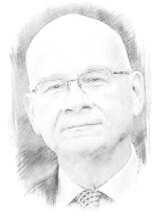tim keller
Timothy Keller (1950–2023) was senior pastor at Redeemer Presbyterian Church, Manhattan. Keller was a co-founder of The Gospel Coalition. He is renowned for his clear, reasoned approach to Christian apologetics and his book THE REASON FOR GOD: BELIEF IN AN AGE OF SKEPTICISM was named Book of the Year for 2008 by World Magazine.
The Top 10 Religion Stories of 2023
9. Pastor and Bestselling Author Tim Keller Dies at 72 Rev. Tim Keller, a pioneering pastor of the multi-site megachurch phenomenon and who wrote 28 books on every aspect of Christian life and theology, died on May 19, 2023. (Emma Winner/Publishers Weekly 12/13/23)
READ MORE>>>>>
9. Pastor and Bestselling Author Tim Keller Dies at 72 Rev. Tim Keller, a pioneering pastor of the multi-site megachurch phenomenon and who wrote 28 books on every aspect of Christian life and theology, died on May 19, 2023. (Emma Winner/Publishers Weekly 12/13/23)
READ MORE>>>>>
May 24, 2023: Ad Fontes: This Article Is About Tim Keller
It is an irony of my life that I became the Keller-critic.
Just over a year ago, my article “How I Evolved on Tim Keller” set off a wave of online discussion, mainly among evangelicals, about the merits of a great man’s ministry. Despite my emphasis on all the strengths of Keller’s work, reiterated in a follow-up video, the horse had bolted somewhat. My name became synonymous with “anti-Kellerism” among both his critics and defenders. For anyone who read my article attentively, however, my admiration for and gratitude to Keller were plain. He shaped my life more than any other contemporary figure. As I made clear in another follow up, my point was never really about the man himself anyway, but about prompting a discussion regarding how times have changed since the height of his influence, and providing a very focused analysis of the limits and perils of his framework for cultural engagement—especially the ways it is perpetuated by his prominent disciples.
It is an irony of my life that I became the Keller-critic.
Just over a year ago, my article “How I Evolved on Tim Keller” set off a wave of online discussion, mainly among evangelicals, about the merits of a great man’s ministry. Despite my emphasis on all the strengths of Keller’s work, reiterated in a follow-up video, the horse had bolted somewhat. My name became synonymous with “anti-Kellerism” among both his critics and defenders. For anyone who read my article attentively, however, my admiration for and gratitude to Keller were plain. He shaped my life more than any other contemporary figure. As I made clear in another follow up, my point was never really about the man himself anyway, but about prompting a discussion regarding how times have changed since the height of his influence, and providing a very focused analysis of the limits and perils of his framework for cultural engagement—especially the ways it is perpetuated by his prominent disciples.
 Anna Grummitt
Anna Grummitt
Outsider and unbeliever though I am, he made me feel like a member of his search party. … And he made me feel loved—by him and by his God.”
Last Friday, Timothy Keller, one of this generation’s best-known Christian leaders, died after a three-year battle with pancreatic cancer.
Although I never met him, Tim Keller had a profound impact on my life. His 2008 bestselling book The Reason for God solidified my faith and became a go-to gift for friends with questions about Christianity. His small-group studies helped me integrate my beliefs with my whole life. His sermon on Psalm 42 encouraged me in a period of doubt, and his Atlantic article ‘Growing my Faith in the Face of Death’ strengthened me when cancer hit my own family.
But after reading tributes to him, I’ve been struck not just by the huge influence he had on Christians like me, but also by how he is remembered by those who aren’t in his camp.
In particular, the above quote from journalist Jonathan Ranch stood out to me. As an atheist, Ranch admits he “can’t understand Tim’s world.” But through Keller, he says, he got “glimpses of it”—glimpses of a world with humility, love, and grace at its core. -Anna Grummitt; CPX: May 23, 2023
Last Friday, Timothy Keller, one of this generation’s best-known Christian leaders, died after a three-year battle with pancreatic cancer.
Although I never met him, Tim Keller had a profound impact on my life. His 2008 bestselling book The Reason for God solidified my faith and became a go-to gift for friends with questions about Christianity. His small-group studies helped me integrate my beliefs with my whole life. His sermon on Psalm 42 encouraged me in a period of doubt, and his Atlantic article ‘Growing my Faith in the Face of Death’ strengthened me when cancer hit my own family.
But after reading tributes to him, I’ve been struck not just by the huge influence he had on Christians like me, but also by how he is remembered by those who aren’t in his camp.
In particular, the above quote from journalist Jonathan Ranch stood out to me. As an atheist, Ranch admits he “can’t understand Tim’s world.” But through Keller, he says, he got “glimpses of it”—glimpses of a world with humility, love, and grace at its core. -Anna Grummitt; CPX: May 23, 2023
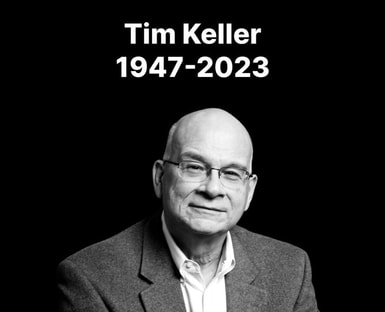
May 20, 2023:
Evangelical minister Timothy Keller died yeterday after a battle with pancreatic cancer. He was 72. Keller was a co-founder of The Gospel Coalition. Keller shunned the label "evangelical" because of its political and fundamentalist connotation, preferring to call himself orthodox because "he believes in the importance of personal conversion or being 'born again,' and the full authority of the Bible."
A few of my favs of his books:
Counterfeit Gods: The Empty Promises of Money, Sex, and Power, and the Only Hope that Matters
Generous Justice: How God's Grace Makes Us Just
Walking with God through Pain and Suffering
Evangelical minister Timothy Keller died yeterday after a battle with pancreatic cancer. He was 72. Keller was a co-founder of The Gospel Coalition. Keller shunned the label "evangelical" because of its political and fundamentalist connotation, preferring to call himself orthodox because "he believes in the importance of personal conversion or being 'born again,' and the full authority of the Bible."
A few of my favs of his books:
Counterfeit Gods: The Empty Promises of Money, Sex, and Power, and the Only Hope that Matters
Generous Justice: How God's Grace Makes Us Just
Walking with God through Pain and Suffering
May 20, 2023: World: He was ready for heaven
Tim Keller’s death shouldn’t have been shocking—his battle with pancreatic cancer was well known—but somehow, even though Tim had outlived the normal prognosis (by a long shot), when his days drew to an end, it still felt sudden. Beautifully, Tim was ready to die. None of us were ready for him to go
Tim Keller’s death shouldn’t have been shocking—his battle with pancreatic cancer was well known—but somehow, even though Tim had outlived the normal prognosis (by a long shot), when his days drew to an end, it still felt sudden. Beautifully, Tim was ready to die. None of us were ready for him to go
May 19, 2023: Christian Post: ‘He changed my life’: 5 remembrances of Tim Keller
Pastor and author Tim Keller died on Friday, after a lengthy battle with pancreatic cancer and shortly after it was announced that he was being put in hospice care.
“Timothy J. Keller, husband, father, grandfather, mentor, friend, pastor, and scholar died this morning at home,” Keller’s son, Michael, shared in a public post on Facebook Friday.
“Dad waited until he was alone with Mom. She kissed him on the forehead, and he breathed his last breath. We take comfort in some of his last words, ‘There is no downside for me leaving, not in the slightest.’ See you soon, Dad.”
Pastor and author Tim Keller died on Friday, after a lengthy battle with pancreatic cancer and shortly after it was announced that he was being put in hospice care.
“Timothy J. Keller, husband, father, grandfather, mentor, friend, pastor, and scholar died this morning at home,” Keller’s son, Michael, shared in a public post on Facebook Friday.
“Dad waited until he was alone with Mom. She kissed him on the forehead, and he breathed his last breath. We take comfort in some of his last words, ‘There is no downside for me leaving, not in the slightest.’ See you soon, Dad.”
Mar 14, 2023: Premier Christian: Tim Keller calls for prayer as cancer update reveals new tumours
Christian pastor and theologian Tim Keller has shared an update on his battle with cancer, asking people to pray after doctors revealed new tumours have been found.
The renowned apologist was first diagnosed with pancreatic cancer in May 2020, aged 69 and has undergone numerous rounds of chemotherapy as well as immunotherapy treatment. In April, Keller will undergo a second round of immunotherapy to target newly developed tumours.
Christian pastor and theologian Tim Keller has shared an update on his battle with cancer, asking people to pray after doctors revealed new tumours have been found.
The renowned apologist was first diagnosed with pancreatic cancer in May 2020, aged 69 and has undergone numerous rounds of chemotherapy as well as immunotherapy treatment. In April, Keller will undergo a second round of immunotherapy to target newly developed tumours.
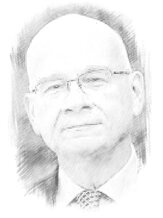 Tim Keller
Tim Keller
“To be loved but not known is comforting but superficial. To be known and not loved is our greatest fear. But to be fully known and truly loved is, well, a lot like being loved by God. It is what we need more than anything. It liberates us from pretense, humbles us out of our self-righteousness, and fortifies us for any difficulty life can throw at us.”
― Timothy Keller, The Meaning of Marriage: Facing the Complexities of Commitment with the Wisdom of God
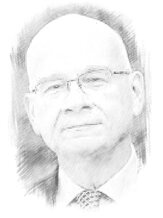 Tim Keller
Tim Keller
“The gospel is this: We are more sinful and flawed in ourselves than we ever dared believe, yet at the very same time we are more loved and accepted in Jesus Christ than we ever dared hope.”
― Timothy Keller, The Meaning of Marriage: Facing the Complexities of Commitment with the Wisdom of God
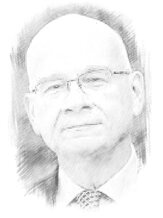 Tim Keller
Tim Keller
Alternative to WorldviewPersonality and Worldview by J. H. Bavinck addresses these concerns and provides a far more nuanced understanding of worldview that, in my opinion, largely escapes these critiques. His emphasis on worldview’s relationship to personality shows that worldview is much more than a set of bullet points on a blackboard. This approach guards against seeing worldview as a mere intellectual framework passed on by intellectual means. Personality and Worldview casts worldview as not only something that forms but also something we deploy in becoming more thoughtful and “objective” in our formation.
His unique contribution—the distinction between a “worldvision” and a “worldview”—explains why so few people live out of a consistent and coherent worldview. The worldvision (or world “mindset” or “mentality”) is a set of basic intuitions picked up from our environment, consisting in simplistic and reductionistic ideas through which we view reality—as through spectacles. A worldview, however, is more like a map, never fully finished in this life, in which we work out the implications of Christianity for every area of life in our time and place.
Bavinck’s emphasis on psychology entails community formation (though he often leaves that implicit). Personality and Worldview in many ways reflects the psychology of an earlier time, and yet it recognizes that our “personality” is not only, as Eglinton explains in his introduction, the result of “the idiosyncrasies of [our inborn] temperament[s]” but “a set of intuitions about the world formed in all individuals by their family and home environment, their teachers and education, and the broad culture within which they live” (12). Here Personality and Worldview anticipates Charles Taylor’s concept of worldview as a “social imaginary”—the way a community of people learns to imagine the world.
The emphasis by J. H. Bavinck and his uncle, Herman Bavinck, on worldview as mapmaking is a crucial idea. Developing a worldview is an effort to transcend the limitations and reductionisms of our worldvision.
If a worldview is something we painstakingly work out our whole lives, several things follow:
-Tim Keller; Gospel Coalition; Tim Keller on How to Reexamine Your Worldview 6.7.23
This article is adapted from Tim Keller’s foreword to Personality and Worldview by J. H. Bavinck, translated and edited by James Eglinton (Crossway, April 2023)
His unique contribution—the distinction between a “worldvision” and a “worldview”—explains why so few people live out of a consistent and coherent worldview. The worldvision (or world “mindset” or “mentality”) is a set of basic intuitions picked up from our environment, consisting in simplistic and reductionistic ideas through which we view reality—as through spectacles. A worldview, however, is more like a map, never fully finished in this life, in which we work out the implications of Christianity for every area of life in our time and place.
Bavinck’s emphasis on psychology entails community formation (though he often leaves that implicit). Personality and Worldview in many ways reflects the psychology of an earlier time, and yet it recognizes that our “personality” is not only, as Eglinton explains in his introduction, the result of “the idiosyncrasies of [our inborn] temperament[s]” but “a set of intuitions about the world formed in all individuals by their family and home environment, their teachers and education, and the broad culture within which they live” (12). Here Personality and Worldview anticipates Charles Taylor’s concept of worldview as a “social imaginary”—the way a community of people learns to imagine the world.
The emphasis by J. H. Bavinck and his uncle, Herman Bavinck, on worldview as mapmaking is a crucial idea. Developing a worldview is an effort to transcend the limitations and reductionisms of our worldvision.
If a worldview is something we painstakingly work out our whole lives, several things follow:
- Worldview isn’t in this metaphor a finished weapon to be wielded against opponents—it guards against triumphalism in that regard.
- It’s always unfinished and growing. That’s humbling as well.
- A Christian in Indonesia wouldn’t be developing the exact same map as a Christian in Scotland. If you’re applying the Christian’s doctrines to all of life, the questions and issues one faces will vary in different places. As such, although Personality and Worldview doesn’t say this explicitly, it gives us the basis for the thought there may be overlapping and noncontradictory but somewhat different Christian worldviews in different cultures. That also undermines triumphalism.
-Tim Keller; Gospel Coalition; Tim Keller on How to Reexamine Your Worldview 6.7.23
This article is adapted from Tim Keller’s foreword to Personality and Worldview by J. H. Bavinck, translated and edited by James Eglinton (Crossway, April 2023)
March 8, 2023: Baptist News Global: Tucker Carlson takes on Russell Moore, Beth Moore, Tim Keller and David French
It’s not just “liberals” who draw Tucker Carlson’s scorn these days. Even some stalwarts of evangelical conservativism are too “woke” to please the acerbic Fox News personality.
It’s not just “liberals” who draw Tucker Carlson’s scorn these days. Even some stalwarts of evangelical conservativism are too “woke” to please the acerbic Fox News personality.
Feb 21, 2023: Gospel Coalition: 20 Quotes from the New Book About Tim Keller
In his new book Timothy Keller: His Spiritual and Intellectual Formation, Collin Hansen surveys the family members, friends, professors, pastors, and authors who shaped The Gospel Coalition’s cofounder. Get your copy of this fascinating deep dive into Keller’s life and influences.
Here are 20 quotes to whet your appetite.
In his new book Timothy Keller: His Spiritual and Intellectual Formation, Collin Hansen surveys the family members, friends, professors, pastors, and authors who shaped The Gospel Coalition’s cofounder. Get your copy of this fascinating deep dive into Keller’s life and influences.
Here are 20 quotes to whet your appetite.
Feb 8, 2023: Christian Post: New Tim Keller Center for Apologetics will equip the Church to reach 'post-Christian' society
The Gospel Coalition has announced the launch of The Keller Center for Cultural Apologetics, a new initiative designed to help pastors, young people and other Christian leaders adapt to a "post-Christendom culture."
Inspired by the legacy of the TGC co-founder, The Keller Center has the stated aim of raising up and supporting "a new generation of bold evangelists and effective apologists who will communicate the unchanging Gospel for a changing world."
The Gospel Coalition has announced the launch of The Keller Center for Cultural Apologetics, a new initiative designed to help pastors, young people and other Christian leaders adapt to a "post-Christendom culture."
Inspired by the legacy of the TGC co-founder, The Keller Center has the stated aim of raising up and supporting "a new generation of bold evangelists and effective apologists who will communicate the unchanging Gospel for a changing world."
Feb 7, 2023: Religion News: New Tim Keller Center for Apologetics hopes to help churches reach a changing country
“This is the largest and fastest transformation of religion in American history,” said Collin Hansen, vice president for content and editorial director for the Gospel Coalition, an evangelical group that produces resources for churches. “The demographics don’t suggest any positive turn around the corner.”
That reality led Hansen and his colleagues to launch the Keller Center for Cultural Apologetics, a new initiative designed to help pastors and other Christian leaders adapt to a “post-Christendom culture.” Named for influential evangelical writer the Rev. Tim Keller, founder of Redeemer Presbyterian Church in New York City, the center hopes to support “a new generation of bold evangelists and effective apologists who will communicate the unchanging gospel for a changing world.”
“This is the largest and fastest transformation of religion in American history,” said Collin Hansen, vice president for content and editorial director for the Gospel Coalition, an evangelical group that produces resources for churches. “The demographics don’t suggest any positive turn around the corner.”
That reality led Hansen and his colleagues to launch the Keller Center for Cultural Apologetics, a new initiative designed to help pastors and other Christian leaders adapt to a “post-Christendom culture.” Named for influential evangelical writer the Rev. Tim Keller, founder of Redeemer Presbyterian Church in New York City, the center hopes to support “a new generation of bold evangelists and effective apologists who will communicate the unchanging gospel for a changing world.”
Apr 7, 2022: Chorus in the Chaos: Sorry Tim Keller, People Reject Christ Because They Reject the Bible
Tim Keller recently tweeted, “Jesus’s teaching consistently attracted the irreligious while offending Bible-believing religious people of His day. However-our churches do not have this same effect which can only mean one thing. Our preaching and practices are not declaring the same message that Jesus did.”
Tim Keller recently tweeted, “Jesus’s teaching consistently attracted the irreligious while offending Bible-believing religious people of His day. However-our churches do not have this same effect which can only mean one thing. Our preaching and practices are not declaring the same message that Jesus did.”
Apr 5, 2022: Gospel Coalition: Don’t Overlook the Value of Cultural Apologetics
Tim Keller engages in both traditional and cultural apologetics. His work brings together pastoral experience and serious and sustained reflection on culture—on the trends and currents of thoughts that influence how people in a society think, feel, and behave.
Tim Keller engages in both traditional and cultural apologetics. His work brings together pastoral experience and serious and sustained reflection on culture—on the trends and currents of thoughts that influence how people in a society think, feel, and behave.
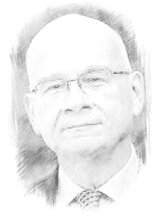 Tim Keller
Tim Keller
A Facebook post by Pastor Timothy Keller on Apr 7, 2022 explains the problems with mega churches:
Thread on why we multiplied Redeemer into three (now five) congregations, rather than give the megachurch to a single successor?
First, because megachurches have some design deficits. In general, they are poor places for formation and pastoral care due to their size. In our current cultural moment that is a deadly problem because Christians are being more formed by social media than local Christian community. We need thick communities and the size of our churches factor into that.
2nd, because megachurches are grown large under a founder, they are not usually sustained by being given to one successor. That person is always excessively and sometimes harshly compared in every way to the founder. It’s lose-lose for them and the movement.
3rd-because megachurches—tend to grow fast under a founder, they usually depend too much on the gifts and personality of that founder so the sooner that addictive dependence is broken, the better.
4th, because often the founder comes to see the church as their personal possession-and an extension of their personality and self-image, they often never want to leave, nor do they know how to well. It is good to leave sooner rather than later as a spiritual discipline.
5th, because I was able to hand off Redeemer to a more diverse group of leaders-instead of one white American, Redeemer has now been led by Sr Pastors who were Chinese, Korean, British, and Nagamese/Lebanese. All, though solidly united on Reformed theology, bring their distinct-enriching cultural perspectives, experiences, and wisdom.
6th, because smaller congregations must make use of a greater percentage of lay persons’ gifts & talents there is less dependence on staff and a smaller number of onlookers who only attend to observe and not participate.
7th, we didn't just want to build one megachurch, our core vision was centered on “to help build a great city for all people through a movement of the gospel.” Gospel movements are fueled by the multiplication of generative churches, and diverse leaders.
8th, megachurches tend to draw people from great distances who then are not geographically close enough to take part in community building, discipleship, and local ministry to the neighborhood of the church. It is harder for them to be other-focused in the local area. Cities and regions can benefit from the unique resources of a megachurch (eg counseling centers, seminaries). But in general, the area—and the Christians—will benefit more from 10 churches of 400 scattered throughout the city, rather than one church of 4,000 in the middle of it.
That was our thought process. Now, while still having the resources of a megachurch, through their size and model, they can be more nimble to the needs of those who attend and the surrounding area.
Thread on why we multiplied Redeemer into three (now five) congregations, rather than give the megachurch to a single successor?
First, because megachurches have some design deficits. In general, they are poor places for formation and pastoral care due to their size. In our current cultural moment that is a deadly problem because Christians are being more formed by social media than local Christian community. We need thick communities and the size of our churches factor into that.
2nd, because megachurches are grown large under a founder, they are not usually sustained by being given to one successor. That person is always excessively and sometimes harshly compared in every way to the founder. It’s lose-lose for them and the movement.
3rd-because megachurches—tend to grow fast under a founder, they usually depend too much on the gifts and personality of that founder so the sooner that addictive dependence is broken, the better.
4th, because often the founder comes to see the church as their personal possession-and an extension of their personality and self-image, they often never want to leave, nor do they know how to well. It is good to leave sooner rather than later as a spiritual discipline.
5th, because I was able to hand off Redeemer to a more diverse group of leaders-instead of one white American, Redeemer has now been led by Sr Pastors who were Chinese, Korean, British, and Nagamese/Lebanese. All, though solidly united on Reformed theology, bring their distinct-enriching cultural perspectives, experiences, and wisdom.
6th, because smaller congregations must make use of a greater percentage of lay persons’ gifts & talents there is less dependence on staff and a smaller number of onlookers who only attend to observe and not participate.
7th, we didn't just want to build one megachurch, our core vision was centered on “to help build a great city for all people through a movement of the gospel.” Gospel movements are fueled by the multiplication of generative churches, and diverse leaders.
8th, megachurches tend to draw people from great distances who then are not geographically close enough to take part in community building, discipleship, and local ministry to the neighborhood of the church. It is harder for them to be other-focused in the local area. Cities and regions can benefit from the unique resources of a megachurch (eg counseling centers, seminaries). But in general, the area—and the Christians—will benefit more from 10 churches of 400 scattered throughout the city, rather than one church of 4,000 in the middle of it.
That was our thought process. Now, while still having the resources of a megachurch, through their size and model, they can be more nimble to the needs of those who attend and the surrounding area.
July 27, 2021: Anxious Bench: Is There a Theological Reason for White Evangelical Racism?
A significant minority faction in white evangelicalism is now newly open to the idea that fighting structural racial injustice is an urgent political priority that Christians need to embrace. This is an important theological move for a tradition that has long been intensely individualistic. If the pages of "Christianity Today" magazine, the writings of Tim Keller, and the actions of Wheaton College (which, after thoughtful reflection, recently removed a plaque containing the word "savages" as part of a memorial to Jim Elliot and other missionaries) are any guide, it appears that a number of influential white evangelicals now believe that fighting racism means opposing racist structures as well as individual racial hatred. In other words, they now know that mere color-blindness does not equate to anti-racism.
A significant minority faction in white evangelicalism is now newly open to the idea that fighting structural racial injustice is an urgent political priority that Christians need to embrace. This is an important theological move for a tradition that has long been intensely individualistic. If the pages of "Christianity Today" magazine, the writings of Tim Keller, and the actions of Wheaton College (which, after thoughtful reflection, recently removed a plaque containing the word "savages" as part of a memorial to Jim Elliot and other missionaries) are any guide, it appears that a number of influential white evangelicals now believe that fighting racism means opposing racist structures as well as individual racial hatred. In other words, they now know that mere color-blindness does not equate to anti-racism.
May 2, 2018: Christianity Today: Tim Keller, John Piper, and Andy Stanley Among the 12 ‘Most Effective’ Preachers
This week, Baylor University’s Truett Theological Seminary released its 2018 ranking of the ministers who set the standard for contemporary sermons. It lists a cross-denominational mix of evangelical heavyweights ranging from Reformed leaders such as John Piper and Tim Keller, to classic preachers such as Chuck Swindoll and the late Haddon Robinson, to fresher voices such as Andy Stanley and Ralph Douglas West.
This week, Baylor University’s Truett Theological Seminary released its 2018 ranking of the ministers who set the standard for contemporary sermons. It lists a cross-denominational mix of evangelical heavyweights ranging from Reformed leaders such as John Piper and Tim Keller, to classic preachers such as Chuck Swindoll and the late Haddon Robinson, to fresher voices such as Andy Stanley and Ralph Douglas West.
Feb 4, 2015: Christianity Today: Tim Keller Found His Prayer Bearings, and So Can You
In his new book, Prayer: Experiencing Awe and Intimacy with God (Dutton Adult), Timothy Keller, founding pastor of Redeemer Presbyterian Church in New York City, invites readers to systematically learn to pray.
In his new book, Prayer: Experiencing Awe and Intimacy with God (Dutton Adult), Timothy Keller, founding pastor of Redeemer Presbyterian Church in New York City, invites readers to systematically learn to pray.
Dec 7, 2013: Huffington Post: Sally Lloyd-Jones, 'Jesus Storybook Bible' Author, Sells Over 1,000,000 Books
“People often ask me, ‘What’s your theological training?’” said Lloyd-Jones, who reads works by John Stott and Martyn Lloyd-Jones and attends Tim Keller’s Redeemer Presbyterian Church in Manhattan. “I’ve been at ‘Tim Keller university.’ I had been hearing how Jesus is in every story for several years.”
Keller wrote the forward to her 2012 book, “Thoughts to Make Your Heart Sing,” and his wife, Kathy Keller, said she gives “The Jesus Storybook Bible” to everyone from university presidents to car salesmen because anyone can understand it.
“Her book isn’t a bunch of collected Aesop’s fables,” Kathy Keller said. “There is an actual narrative to redemption. The stories are not meant to say ‘Live like this, be like this.’ They’re telling us about Jesus. ”
“People often ask me, ‘What’s your theological training?’” said Lloyd-Jones, who reads works by John Stott and Martyn Lloyd-Jones and attends Tim Keller’s Redeemer Presbyterian Church in Manhattan. “I’ve been at ‘Tim Keller university.’ I had been hearing how Jesus is in every story for several years.”
Keller wrote the forward to her 2012 book, “Thoughts to Make Your Heart Sing,” and his wife, Kathy Keller, said she gives “The Jesus Storybook Bible” to everyone from university presidents to car salesmen because anyone can understand it.
“Her book isn’t a bunch of collected Aesop’s fables,” Kathy Keller said. “There is an actual narrative to redemption. The stories are not meant to say ‘Live like this, be like this.’ They’re telling us about Jesus. ”


